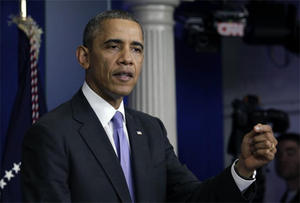ImmigrationObama uses executive power to changes immigration policy
President Barack Obama is using executive power to tackle the country’s immigration issues while Congress makes little progress on immigration overhaul. The president issued executive orders prohibiting deportations of individuals who arrived in the United States illegally as children, individuals who care for children, and individuals who have no criminal records. Recently, some relatives of military service members living in the country illegally have been allowed to remain in the country as a way to lessen stress on the military and reward veterans.

President will act without legislation if need be // Source: baomoi.com
President Barack Obama is using executive power to tackle the country’s immigration issues while Congress makes little progress on immigration overhaul. The president issued executive orders prohibiting deportations of individuals who arrived in the United States illegally as children, individuals who care for children, and individuals who have no criminal records. Recently, some relatives of military service members living in the country illegally have been allowed to remain in the country as a way to lessen stress on the military and reward veterans.
The Miami Herald reports that immigration overhaul in Congress is at a standstill, and as a result, Obama is gradually altering immigration policy on his own.
“What this administration has undertaken has never happened to this degree,” said Mark Krikorian, the executive director of the Center for Immigration Studies, a Washington, D.C.-based think tank advocating a more restrictive immigration policy.
The president is also criticized by immigration advocates. “The president has the legal authority to exercise discretion in immigration enforcement, and to date, that authority has been exercised poorly,” said Pablo Alvarado, the executive director of the National Day Laborer Organizing Network, which is leading the charge against deportations.
Critics of the president from the right have charged that the president is violating the constitution by relying on executive orders, leading to congressional hearing.
Several ICE agents sued the president and the leadership of DHS claiming that the administration’s policy on removing undocumented immigrants makes it impossible for them to perform their duties in manner consistent with federal law.
“The current administration is picking and choosing which laws to enforce,” said Representative Robert Goodlatte (R-Virginia), chairman of the House Judiciary Committee. “The president cannot refuse to enforce a law simply because he dislikes it.”
The Herald notes that the Department of Homeland Security has issued a series of changes to how immigration cases should be handled, relying on the notion of prosecutorial discretion — the wide latitude prosecutors are allowed in determining whether to prosecute violations of the law.
“In the absence of any immigration action from Congress to fix our broken immigration system, what we’ve tried to do is focus our immigration enforcement resources in the right places,” Obama said in 2012. According to Kevin Johnson, an immigration policy expert and dean of the University of California Davis, School of Law, the president could halt all deportations in the same way a governor could ban executions, but such a move would make it more difficult to bring Republicans to the table for an immigration overhaul. “Could he put a moratorium on removals? Yes,” Johnson said. “But politically it would be a disaster. It would end the possibilities for comprehensive immigration reform.”
In 2011 the administration called for the deportation only of undocumented immigrants who committed serious crimes, including those who threaten national security, and who have recently crossed the border.
Despite the various measures adopted by the administration to make life of some undocumented immigrants easier, the administration has continued to deport about 400,000 undocumented immigrants a year.
“It’s an effort to shift priorities,” said Marshall Fitz, the director of immigration policy at the Center for American Progress. “Doesn’t it make sense to prioritize?”
